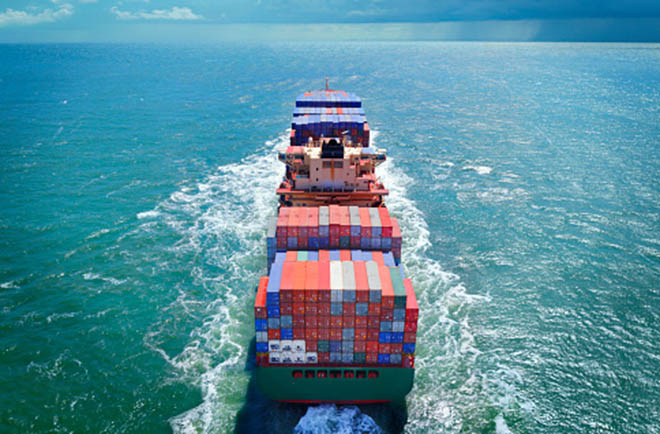S&P Global Offerings
Featured Topics
Featured Products
Events
S&P Global Offerings
Featured Topics
Featured Products
Events
S&P Global Offerings
Featured Topics
Featured Products
Events
Financial Institutions
Banking & Capital Markets
Economy & Finance
Energy Transition & Sustainability
Technology & Innovation
Podcasts & Newsletters
Financial Institutions
Banking & Capital Markets
Economy & Finance
Energy Transition & Sustainability
Technology & Innovation
Podcasts & Newsletters
S&P Global Offerings
Featured Topics
Featured Products
Events
19 Oct, 2021
By Karin Rives

| Maritime shipping accounts for more than 1 billion tons of climate-warming emissions annually. Source: Narvikk/Getty Images Creative via Getty Images |
Amazon.com Inc., IKEA AB, Michelin and six other multinational companies announced Oct. 19 that they will begin to replace maritime shipping oil with cleaner fuels with the goal of operating 100% zero-emission vessels by 2040.
Ocean freight only accounts for about 3% of global greenhouse gas emissions, but with more goods being shipped around the planet, that share could expand to 17% by 2050.
The announcement comes as companies seek to demonstrate corporate leadership with the crucial 2021 United Nations Climate Change Conference in Glasgow, Scotland, less than two weeks away and with the world's attention increasingly focused on disruption and economic losses on a rapidly warming planet.
The pledge "sends a clear market signal to the maritime value chain and fuel producers," said Jonathan Lewis, director of transportation decarbonization at the Clean Air Task Force, one of the groups supporting the new Cargo Owners for Zero Emission Vessels initiative. "We commend these pioneers and encourage companies around the world to follow their lead."
The companies are expected to develop interim, short-term goals to be able to track their progress, Lewis said in an email. Over time, the plan is to develop zero-carbon transoceanic shipping corridors and to develop market tools such as multiyear contracts to build demand for zero-carbon shipping, Lewis said.
In all, maritime shipping accounted for more than 1 billion tons of carbon emissions annually in 2018, according to the most recent greenhouse gas inventory by the United Nations-led International Maritime Organization, or IMO. That figure, which represented nearly a 10% increase since 2012, includes releases from the fishing industry.
Emissions from the shipping industry are not covered by the 2015 Paris Agreement on climate change but are regulated under the U.N.'s sustainable development goals. The IMO set a target in 2018 to cut carbon emissions from ships in half by 2050, a goal that Amazon and the other companies are now trying to beat.
How successful the companies will be in truly reaching zero emissions by 2040 will depend, among other things, on how the companies define "emissions-free" fuel, said Bryan Comer, the marine program lead for the International Council on Clean Transportation, an environmental research group.
"You couldn't just burn ammonia in the marine engine, or you couldn't just run hydrogen in a fuel cell, and call it zero emissions if the alternative fuel was made from fossil fuels," Comer said. "There would be all these upstream emissions that weren't accounted for, even if the downstream emissions are low or even zero."
But the initiative is meaningful because it shows that companies are beginning to align their strategies with the carbon reduction targets set by the Paris accord, Comer said.
In November, the IMO will begin to revise its greenhouse gas strategy for 2030, which is expected to set more stringent emission reduction mandates for the industry by the mid-2020s. At the same time, the shipping sector is beginning to test new technologies and fuels that will allow a shift away from oil.
New fuels, new challenges
In Europe, small ferries are already running on hydrogen fuel. And the world's largest shipping engine manufacturer, Germany-based MAN Engines, is expected to start testing ammonia fuel engines in 2022.
To qualify as net-zero vessels, large freight carriers running on ammonia will have to control a new and even more potent greenhouse gas: nitrous oxide emissions created by their engines that have 300 times the warming punch of carbon dioxide. The tests that MAN Engines will conduct will measure the extent of the problem and how to treat the exhaust of nitrous oxide to keep it from escaping into the atmosphere.
Such efforts will accelerate as more companies that move freight demand cleaner transportation options, industry observers believe.
"Many of the companies behind today's announcement are huge with truly global reach, but the goods they move by sea still collectively represent a very small fraction of global container shipping," Lewis said. "The...companies' goal is to show their customers, their competitors, policymakers and the general public that it's not just possible, but actually good business, to chart a path to zero-carbon shipping."
